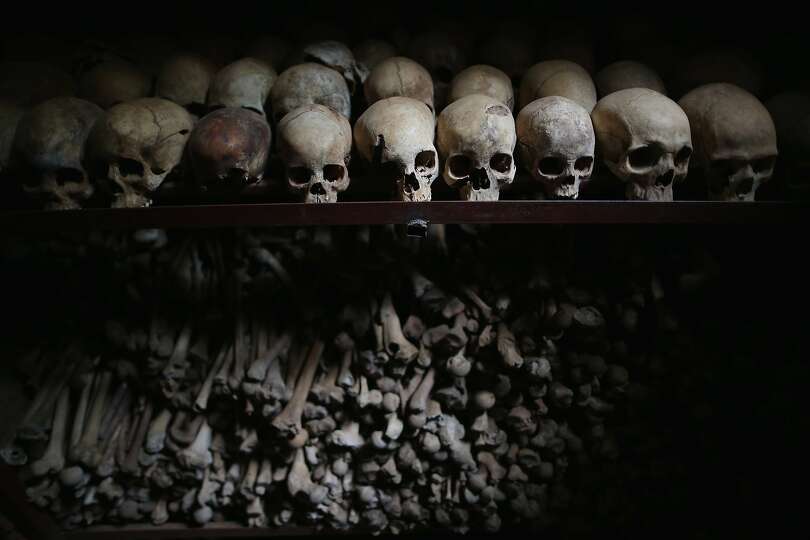The Devil's Price Tag
"We didn't know he was free. I hadn't heard anything of him in two years. "
"We are happy to hear that now he is not on the street and hope the United States government will hand him over to Canada Border Services and the process of deportation starts over again as soon as possible."
"We hope things will move faster than it did before."
"This kind of crime, genocide, is never too old. The community will feel more comfortable -- and proud of our second country, Canada -- if Canada does everything possible to bring him to justice."
Alain Ntwali, president, Association Humura (Rwandan genocide survivors)
 |
| Chip Somodevilla/Getty Images Metal racks hold bones of thousands of genocide victims inside one of the crypts at a memorial in Rwanda |
Good luck on that one. Canada is making an effort to see justice done for the victims of the Rwandan massacre of Tutsis by the ruling Hutu in 1994, a gruesome wildly lunatic massacre in an episode of ethnic violence in Africa that will remain a subject of discussion throughout history in the countless other such episodes when one group of people turn their deadly hatred against another.
The Rwandan genocide sits alongside the Turkish mass slaughter of Armenians, the Soviets deliberately mass-starving Ukrainians, the unspeakable Pol Pot regime in Cambodia's mass murders, the Sudan government waging ethnic slaughter against the black Sudanese people of Darfur, the current government of Syria waging all-out war against its Sunni Syrian population. And, above all, the unspeakable atrocities of the Nazi-inspired Holocaust seeking to obliterate world Jewry.
Today's is a different Canada. Although Canadian soldiers fought valiantly against Nazi Germany and the Axis powers, once World War II came to an end, and former Nazis migrated to Canada, taking care not to declare their fascist-criminal war crimes when seeking immigration status, authorities were none too concerned. Jews, however, became aware of the presence of former death camp guards walking the streets of Toronto.
In this different era Canada is striving to meet its humanitarian and justice obligations and attempts to disallow entry into the country of any foreign national who has been engaged in conflict situations such as the above. Jean Leonard Teganya, a Rwandan Hutu is the eldest son of a convicted war criminal in Rwanda, who ten years earlier had sought refuge in Canada and was returned to his native country to face justice.
Now it is his son's turn. Jean Leonard Teganya was a medical student interning at the Butare University Hospital in Rwanda at a time that Hutu extremist government militias ran rampant killing patients, staff and moderate Hutus in the 1994 horrors of Tutsi extermination. As a medical student, he might have reacted by objecting to seeing helpless patients slaughtered, but he did not.
In that one hundred days of unspeakably bloodthirsty mayhem and carnage, 800,000 people were slaughtered. During legal challenges by Mr. Teganya -- whose asylum claims the Immigration and Refugee Board had twice rejected -- hoping to remain in Canada, the Federal Court of Canada studied evidence of lists drafted naming patients and staff at the hospital meant to be the targets of the genocide; of Tutsi patients turned toward death by marauding militamen.
His claims for asylum were rejected on the basis of the belief by the Immigration and Refugee Board that he had direct knowledge of atrocities being committed, and as such was complicit in those human rights abuses. For his part, Mr. Teganya held he was not involved in the violence, and was himself spared only because of his Hutu ethnicity; an obvious liability in that statement that does not appear to have occurred to the man.
The Federal Court's interpretation was that because Mr. Teganya had been "left unscathed", this alone represents evidence that he was "considered to be an extremist" by the militants; at the very least disinterestedly uninvolved in the dread fate of his countrymen, doing nothing whatever to attempt to avert their calamitous ending. So unconcerned, in fact, that he remained at the hospital afterward, to complete his internship.
When his legal challenges all failed, his deportation to Rwanda was scheduled to take place on October 23, 2012. Mr. Teganya chose on this occasion also to remain uninvolved, and simply ignored the order to appear at the time and place scheduled for his removal. After which he was placed on Canada's Border Services Agency's "wanted list" of those being sought, for forcible removal from Canada.
Last Sunday there was an alert by a citizen in backcountry Maine who had noticed a man walking through the woods at the border between Maine and New Brunswick. Soon enough, a border agent dispatched to respond found a man who identified himself as Jean Leonard Teganya, walking across the border without due process. When he was arrested and taken to the border patrol station, a fingerprint search revealed his identity; a man wanted in Canada for complicity in war crimes.
With his wife and children living in Canada, Mr. Teganya himself will not find a place for himself in the country. He is being held without bail at an American correctional facility. As someone with no legal status in Canada, the United States could choose to send him directly to Rwanda, once found to be inadmissible to the United States.
For having sought and failed refugee status in Canada, international law denies him the right to apply for refugee asylum in another signatory country.
Labels: Canada, Crimes, Immigration, Justice, Rwanda

0 Comments:
Post a Comment
<< Home